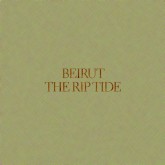Beirut, or 25 year old New Mexico native Zach Condon, has certainly kept his devotees waiting for The Rip Tide.
It’s taken four years for him to record and release the follow up to 2007’s critically acclaimed The Flying Club Cup, and his newest effort sees Condon more considered than on its predecessor, and debut Gulag Orkestar. Sonically and thematically, both of his earlier releases were very much tied to a particular area of the world, Orkestar in the mountains of Eastern Europe and The Flying Club Cup on the back alleys and terraces of France and Italy. The Rip Tide, however, sees Condon synthesising his influences into an occasionally less striking, but certainly more rounded set of songs.
Opening track A Candle’s Fire is built around an accordian motif that’s more Arcade Fire than The Flying Club Cup’s Francophilia, air-punching its way to a triumphant climax, and Santa Fe is a joyous, sun-drenched roadtrip to it’s namesake, plotting an insistent trajectory from bitcrushed beats and niggling keyboard to those majestic horns that Condon does so well. On early listens, it can feel like the propulsion of the album’s opening double team, not to mention the considerable weight of the Beirut back catalogue, turns the remainder of The Rip Tide into a bit of a non-starter. Tracks like the more subtly percussive East Harlem can seem to serve as thoroughfares between the album’s more memorable pieces. Payne’s Bay, as well, may contain the Balkan-styled horns that won Gulag Orkestar so many fans, but ultimately, it lacks direction, a waltzing oompah that doesn’t really lead anywhere.
However, on revisitation, many of The Rip Tide’s less immediate tracks begin to reveal their charm. Goshen has a studied, low-key tenderness to it, Condon’s gently undulating voice backed by ponderous ivories, martial drumming and of course more brass, elegiac this time. The title cut comes as something of a drowsy reprise of Santa Fe, illuminating the same stunning vistas in woozy sunset rather than high noon. The Peacock is all the more effective for its drumless backdrop, just lonely, droning organ and vocal harmony, and it provides the perfect precursor to closer Port of Call, which layers its way enticingly up from a brittle, bareboned strum to a gorgeously lilting peak.
On The Rip Tide, Zach Condon’s choice to not tie himself to the traditional sound of a particular country or culture has served him well in the sense that he’s proved (if the calibre of songwriting on the first two Beirut records didn’t) he’s capable of more than just genre experimentation. The Rip Tide can feel a little slow and singular at first, but on repeated listens it’s sure to sweep you away.
